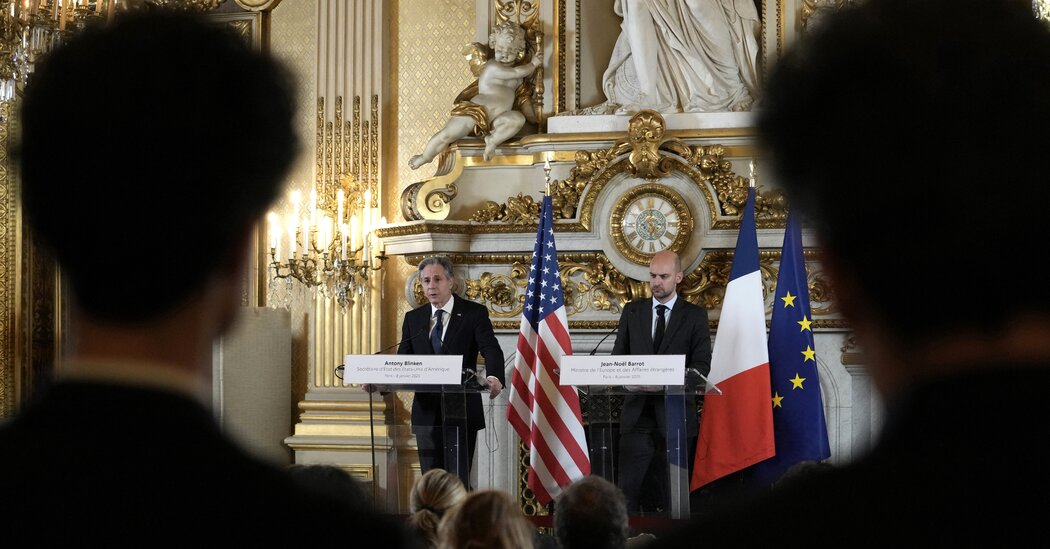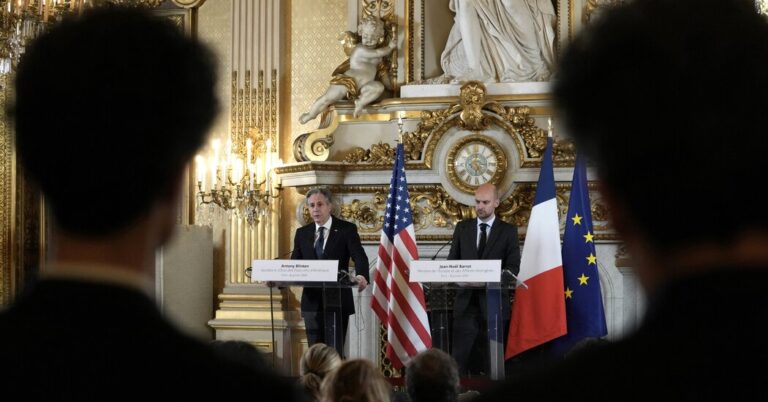Secretary of State Antony J. Blinken and his French counterpart, Jean-Noël Barrot, spoke in Paris on Wednesday about the challenges already posed to U.S. alliances by Donald J. Trump’s imminent return to the White House, and said they believe that a The American conquest of Greenland was an impossible idea.
But they also said their nations will try to continue working together despite potential political turbulence in the coming years, including war in Ukraine and conflicts in the Middle East.
In recent days, European leaders have focused on what many see as incendiary statements from Trump and his allies. The president-elect has said he would like to make Greenland part of the United States. The autonomous territory is controlled by NATO ally Denmark. And one senior adviser, billionaire entrepreneur Elon Musk, has declared his support for a far-right political party in Germany.
“The idea expressed about Greenland is obviously not a good one, but perhaps more importantly, it’s obviously an idea that’s not going to happen,” Blinken said at a news conference with Barrot. “So we probably shouldn’t waste a lot of time talking about it.”
He preceded it with advice clearly aimed at Trump: “We are stronger, we are more effective, we achieve better results when we work closely with our allies, without saying things that might alienate them.”
Barrot agreed that he doesn’t think the United States will invade Greenland, but said, “Do we think we’re entering a period where we’re going back to the law of the jungle? The answer is yes.”
Subsequently, when speaking about Ukraine, he also placed Russian President Vladimir V. Putin directly in that context.
“It is a question of the future of international law,” Barrot said. “If we accept Ukraine’s capitulation, we will allow force to prevail. It is a question of security for the French people, as well as for Europeans.”
Blinken’s stop in Paris is part of a final, whirlwind diplomatic trip in which he will visit Asian and European allies. He met with officials in Seoul on Monday, amid the biggest political crisis to erupt in South Korea in decades; held talks in Tokyo the next day, soon after the Biden administration blocked a steel industry merger sought by Japanese officials; and then flew overnight to Paris, via Alaska to avoid Russian airspace.
Blinken’s visits to South Korea and Japan reflected the importance of those nations in the U.S. government’s calculations to establish military deterrence against China and North Korea. Both are key allies that host U.S. military bases and troops. And France was one of the most important allies in opposing Russia’s full-scale invasion of Ukraine and supplying weapons to the Ukrainian army.
Like other European officials, those in Paris are worried about Trump’s return, although few were truly surprised by the outcome of the US elections.
In Mr. Blinken, President Biden has a diplomat suited to try to reassure the French: He grew up in an intellectual environment in Paris and speaks fluent French, which he used here in an ornate room of the Foreign Ministry, in what was it will almost certainly be his last press conference abroad as secretary of state.
Both Blinken and Barrot highlighted in their opening remarks the diplomacy their nations have carried out together during recent crises, particularly the war between Israel and Hezbollah in Lebanon and the war between Russia and Ukraine. Their nations have also sought to coordinate on policies toward Syria, where rebels recently overthrew longtime dictator Bashar al-Assad.
“I am pleased that you will continue to carry the torch in the coming months on these critical issues for our two countries,” Blinken told Barrot.
The French minister praised Blinken, using language that appeared to contain a veiled criticism of the America represented by Trump.
“You embodied the face of the America we love,” Barrot said. He spoke of a nation that built an “international order based on law” after the Second World War through “its elevated outlook, its visceral attachment to the values of freedom.”
At one point, he said: “We have survived about 59 American elections and, of course, we will survive the 60th American election.”
Among their concerns, European leaders fear the possibility of Trump imposing new tariffs at a time of anemic growth in Europe compared to the United States.
Blinken’s visit comes at a time of intense internal political division for France. It’s a moment that François Bayrou, the centrist prime minister appointed last month, has called the “most difficult” situation for the country since the end of World War II. But for the moment, these divisions mainly affect France’s internal politics, particularly its inability to approve the budget.
All of this has served to weaken President Emmanuel Macron’s hand at home. But under the French system, Macron, who considers himself a pragmatic centrist, still holds great influence when it comes to foreign affairs. This provided some continuity in the French position towards Trump.
This attitude is a mix of concern, caution and Macron’s belief that he has a clear vision of the American president-elect and his mercurial governing style. Macron was elected president in 2017, the same year Trump took office for his first term.
Over the years, the French president has sought to preserve Franco-American relations while preparing his country – and Europeans more generally – for the possibility that the continent will increasingly have to fend for itself militarily, given skepticism of Trump regarding the role of the United States. in NATO.
At a campaign event last year, Trump implied he would not abide by NATO’s collective defense provisions, known as Article 5, and also said he would “encourage” Russia “to do whatever the hell it wants” to countries that had not done so. contributed sufficiently to the alliance.
During his annual New Year’s speech, Macron, reiterating a position he has taken many times before, said that Europe can no longer “delegate its security and defense to other powers”, promising to continue investing in “rearmament French military”. .”
On Monday, Macron expressed concern about Musk, who recently used his social media platform, X, to praise a German far-right party and attack Britain’s Labor Party prime minister.
Without mentioning Musk’s name, Macron said: “Ten years ago, if we had said that the owner of one of the largest social networks in the world would support a new international reactionary force and intervene directly in elections, including in Germany, who would you have imagined it?”
At the press conference on Wednesday, when asked about Musk, Blinken said: “Private citizens in our country can say what they want, what they believe, and everyone else can draw their own conclusions and take the own position on the topic. question.”
Mr. Barrot said the same about Mr. Musk. Shortly afterward, Blinken boarded a convoy to go to the Elysée Palace to meet Macron and receive the Legion of Honor, awarded by the French to people they consider true friends.
Catherine Porter contributed to the reporting.





